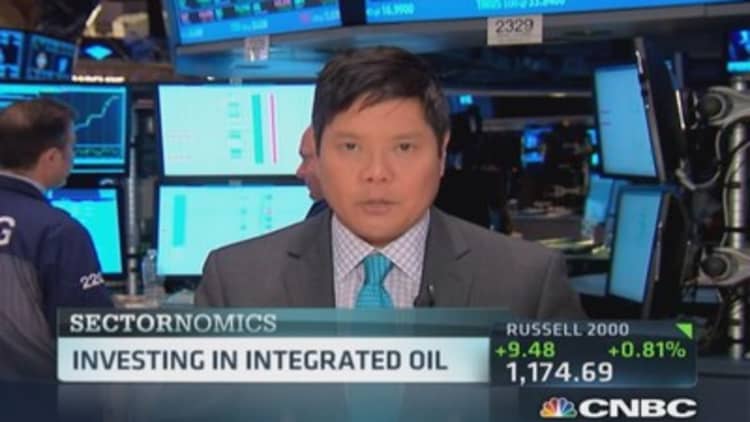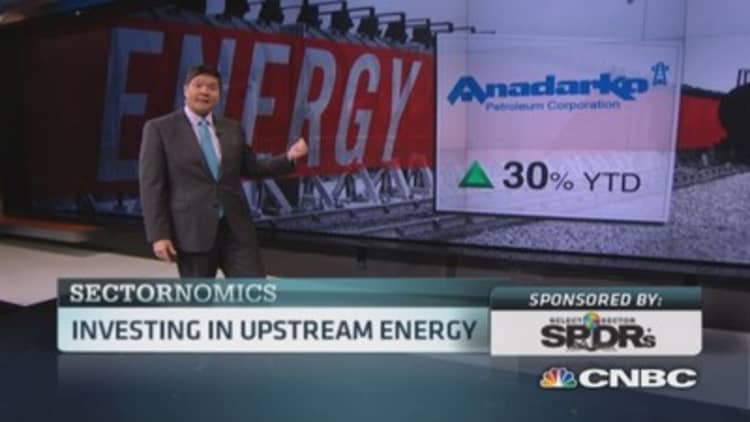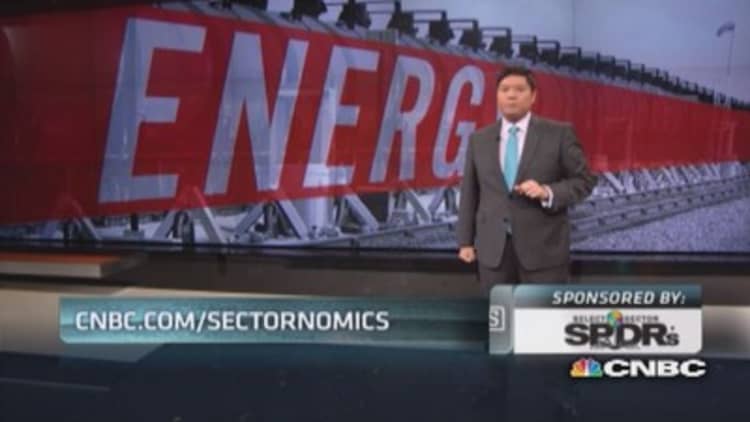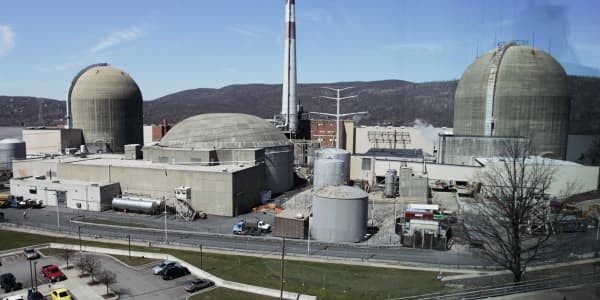Warren Buffett has been a big believer in and buyer of U.S. energy—indirectly. When it comes to direct investments in energy stocks, though, Buffett—famous for using an elephant-gun analogy to describe his hunt for acquisitions—has been notably gun-shy.
Some recent bets on big oil and gas stocks suggest that Buffett and his stock-picking lieutenants—former hedge fund managers Todd Combs and Ted Weschler—are open to a wider range of direct energy stock investments.
Buffett's biggest-ever acquisition, Burlington Northern Santa Fe Railway, is an indirect play on Western coal transport as well as the Bakken shale boom and the railcars now being relied on to move the oil to market. One of Berkshire Hathaway's most capital-intensive businesses is Berkshire Hathaway Energy, a sprawling utility empire that encompasses power generation from coal plants to wind and solar. Buffett said earlier in June at the Edison Electric Institute annual conference that Berkshire is ready to double its $15 billion commitment to wind and solar power through its wholly-owned Berkshire Hathaway Energy unit.
But as the U.S. underwent the first decade of a transformative shale boom, Buffett didn't step up to buy any U.S. exploration or production or oil service companies for Berkshire Hathaway's portfolio of public stocks to capture that theme. And maybe for good reason: Buffett got a few big energy bets wrong in recent years.
In 2007 and 2008, Buffett made significant purchases of ConocoPhillips shares at the height of the bull market and the "peak oil" price of $150 that preceded the financial crash.
"Buffett went into standstill mode after Conoco," said Greggory Warren, Morningstar analyst.
Read MoreEnergy stock boomers with a little room left to run
The shale boom caught Buffett napping, albeit indirectly, too: The Berkshire Hathaway CEO announced earlier this year that the company would be taking an $873 million loss on an Energy Future Holdings bond that he bought before the depressed prices in the glutted natural gas market sent the energy company into bankruptcy.
More recently, Berkshire Hathaway has built positions in Exxon Mobil, oil services company National Oilwell Varco and oil-sands driller Suncor Energy. Two of the bets, National Oilwell Varco and Suncor, are small enough to be made by the hedge fund lieutenants at their own discretion. The Exxon Mobil stock purchases, though, valued at roughly $4 billion at the time of Berkshire's last quarterly stock filing, would have to be put on Warren's desk—or emanate from his desk—before being approved.
Never in 'Warren's wheelhouse'
"[Energy] was never in Warren's wheelhouse,'' Morningstar analyst Warren said. "There's probably some influence from Todd and Ted in there, some more confidence with the energy names now that he has more eyes to watch over them. Given his issue with COP in the past, he has got to be leaning more on Todd and Ted," he added.
Buffett has long sought investments in industries that he considers cornerstones of the modern economy and bets on the U.S. economy, in particular. His portfolio of publicly-traded stocks reflects the wide-ranging nature of those bets—from the big banks to the brand-name consumer products companies.
To be sure, energy is still only a small chunk of Berkshire's holdings.
Out of 43 public companies in its portfolio of publicly-traded stocks, Berkshire has nearly $7 billion invested in five energy companies. The largest is the holding in Exxon Mobil. The Suncor stake is worth about $450 million, according to Berkshire's most recent 13F filing, with the Conoco position worth $775 million and Berkshire's chunk of Conoco's spun-off downstream company, Phillips 66, worth about $750 million. The stake in National Oilwell is worth a little shy of $700 million.
Read MoreWhen it will be time to buy coal stocks again
"Exxon is the seventh-largest holding—it's not trivial,'' said George Washington University law professor Lawrence Cunningham, whose book "Berkshire After Buffett" is set to be published by Columbia University Press in Fall 2014. "But American Express is $14 billion; Wells Fargo is $22 billion. Exxon is not at the top, but it's big.''
The energy stocks don't come close to being Buffett's biggest bet on energy, either, Cunningham said.
Berkshire Hathaway Energy is owner of everything from utilities to gas pipelines to the $15 billion worth of solar and wind investments, which Cunningham said is the parent Berkshire's biggest commitment to any industry other than insurance. The energy business got even bigger last year when Berkshire shelled out nearly $6 billion to buy NV Energy, the largest utility in Nevada.
On a global basis, energy is still a growth industry. There are growth markets for energy—it's slow but it marches on.Lysle Brinkerdirector of transaction, valuation and risk research at IHS Energy
Most investors don't have Berkshire Hathaway's unique problem of generating so much cash it has to find capital-intensive businesses as funnels for ongoing reinvestment: Burlington Northern and Berkshire Hathaway Energy, in the case of Berkshire. For ordinary investors who like to bet like Buffett, it's best to look at the publicly-traded Big Oil stocks.
The biggest of the world's five so-called majors, Exxon Mobil is benefiting from a trend back toward integrated energy producers after the 2008-2012 plunge in energy prices burned companies that focus more tightly on exploration and production. Companies including Exxon Mobil can benefit from the ability to balance the swings in drilling, refining and transporting oil and gas, which often have different economic cycles, said Lysle Brinker, a research director at consulting firm IHS Energy.
The big oil companies also have a lot of potential for the grind-it-out total-return kind of investment style that has been the Berkshire way, analysts said.
Bottom-lining Big Oil
Exxon is not without its detractors. When it came to the shale boom, it started late and, according to critics, overpaid in a major way for XTO Energy, a huge $31 billion shale acquisition. It has grown production slower than rivals like Chevron and Occidental Petroleum, and analysts still believe it will boost profits more slowly than other major oil companies.
On the other hand, Exxon Mobil is in a position to scale back the growth of its capital spending—which recently reached $40 billion annually—after a surge tied to the last decade's rush to find and begin exploiting reserves of shale oil and gas, said Asit Sen, Cowen and Company analyst. Sen expects an average of $37 billion in capital spending through 2017.
Brinker said Exxon Mobil has been better than many at avoiding big, costly safety problems or badly unproductive decisions about exploration. "Exxon pretty much executes on that business model better than anyone else," he said. It also offers a 2.69 percent dividend.
Recent results show progress.
In the first quarter, Exxon's net income for the equivalent of each barrel of crude oil (a way of blending results from different energy sources) rose to $20.55, up more than $3 from a year earlier, Sen said.
"We estimate that every $1 improvement in unit profitability should increase XOM's annual EPS by $0.35 a share," Sen wrote in a recent report.



Buffett added to his Exxon Mobil position at the same time that Berkshire Hathaway reduced holdings in ConocoPhillips and Phillips 66. In the most recent quarterly filing, Berkshire owned a little more than 11 million shares of ConocoPhillips and close to 10 million shares of Phillips 66, down from roughly 13.5 million shares of ConocoPhillips and 26 million shares of Phillips 66 last year.
But ConocoPhillips has done better since the split-up of its upstream and downstream businesses in 2012. Phillips 66, which owns chemicals, refining and energy-transportation businesses, like pipelines, has more than doubled since the split, while exploration and production company ConocoPhillips has jumped by 50 percent.
Like Exxon Mobil, Conoco is using a grind-it-out financial strategy: a few percentage points of growth annually in production, combined with 5 percent gains in profits per barrel based on efficiency, coupled with a dividend of 3.25 percent a year, the company said at an investment conference in May. The company claims to have the lowest cost of production of the major energy companies.
"We're gaining confidence with the story,'' said Howard Weil, an analyst at Blake Fernandez.
Read MoreThis comeback sector has to be headed for a correction
These mature businesses still have enough pockets of growth in the developing world to reward investors even as energy intensity declines in developed economies, Brinker said.
"On a global basis, energy is still a growth industry," Brinker added. "There are growth markets for energy—it's slow, but it marches on."
Some more explanations for Buffett's sudden love of Exxon Mobil
Before reading too much into Buffett's stake in Exxon Mobil, consider these additional points:
1. It's much better than gold.
In a portion of Buffett's annual letter in 2011 on why gold was not a good investment, he used 16 Exxon Mobils and all of the farmland in the U.S. to make an analogy about assets equal to the then value of the gold market: $9.6 trillion.
"A century from now, the 400 million acres of farmland will have produced staggering amounts of corn, wheat, cotton and other crops—and will continue to produce that valuable bounty, whatever the currency may be. Exxon Mobil will probably have delivered trillions of dollars in dividends to its owners and will also hold assets worth many more trillions (and remember, you get 16 Exxons). The 170,000 tons of gold will be unchanged in size and still incapable of producing anything. You can fondle the cube, but it will not respond."
The irony at the time was that Berkshire had just sold a small stake in Exxon. So maybe it just took Buffett a few years to reconsider his own argument and begin amassing his stake in 16 Exxon Mobils.
2. It's better than cash (and maybe the safest thing the market has).
Berkshire Hathaway's biggest problems may be finding a way to stay ahead of the S&P 500 (which slammed him in 2013) and ultimately replacing Buffett, but finding investments for its cash so the money doesn't sit on the sidelines is also critical to its performance.
While Buffett has been talking elephant gun for a few years, he has yet to deliver on an acquisition to match the Burlington Northern deal. If the cash is burning a hole in his pocket, better to keep it in the market's closest equivalent to cash than cash itself: Exxon Mobil.
In fact, for an example of this strategy in the past, when Buffett acquired Burlington Northern, Alleghany was one of the railroad's biggest shareholders, at 34 percent of the company. The investment holding company suddenly had a ton of cash to invest. Shortly thereafter, Alleghany made a big investment in—yes, you guessed it—Exxon Mobil.
—By Tim Mullaney, special to CNBC.com





